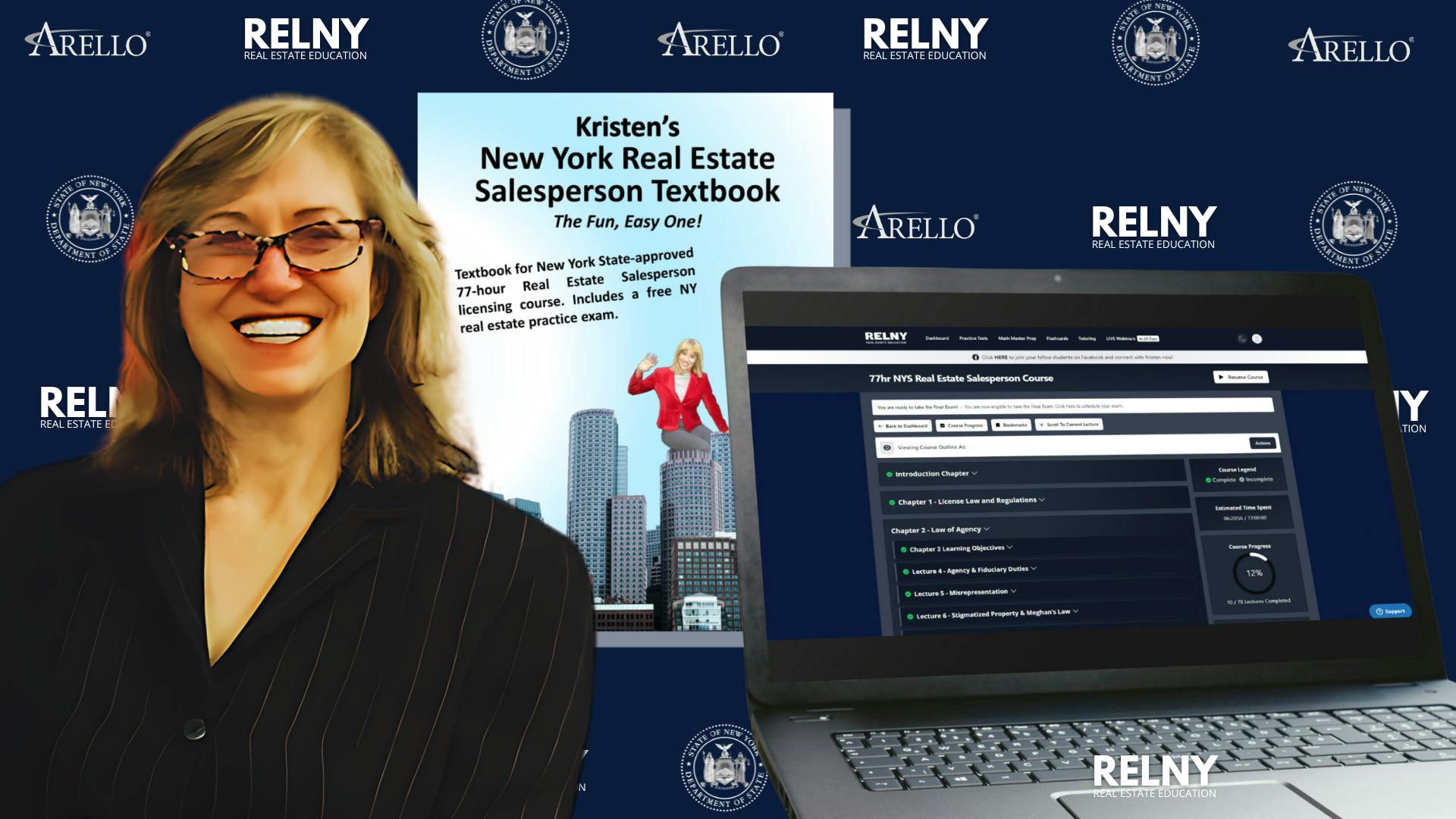What is Capital Appreciation? Understanding Real Estate Concepts
A Key Concept for Real Estate Licensing Exams

-
Course Certified & Accredited by NYS DOS & ARELLO®
-
77 Hour NYS Real Estate Salesperson Licensing Course
-
Live Office Hours with Kristen
-
Take Final Exam at Home
-
Kristen's 1:1 Private Tutoring
-
Subtitles/Transcripts for all languages offered by NYS DOS
-
Call/Text (877) 997-3569
What is Capital Appreciation?
Capital appreciation refers to the increase in the value of a real estate asset over time. Unlike rental income, which provides a steady cash flow, capital appreciation represents the growth in the property’s market value. When a property appreciates in value, the owner stands to make a profit if they decide to sell the property at the higher market price.
How Does Capital Appreciation Occur?
Several factors contribute to capital appreciation, including:
- Location
Properties in desirable areas with good schools, low crime rates, and strong job markets tend to appreciate faster. The location's economic stability and development prospects play a significant role.
- Market Conditions
The overall real estate market conditions, including supply and demand, interest rates, and economic growth, can influence property values. In a seller's market, where demand exceeds supply, property values tend to rise, leading to capital appreciation.
- Property Improvements
Renovations and improvements can increase a property's value. For instance, updating a kitchen, adding a bathroom, or enhancing curb appeal can significantly boost a property's market price.
- Inflation
As the general price level of goods and services rises, so do property values. Inflation erodes purchasing power, leading to higher property prices, which contributes to capital appreciation.
- Government Policies
Zoning laws, tax incentives, and infrastructure development can also impact property values. A government investment in infrastructure, like building new roads or public transport links, can increase the desirability of an area, leading to capital appreciation.
Why is Capital Appreciation Important for Real Estate Professionals?
Understanding capital appreciation is vital for several reasons:
- Investment Decisions
Real estate agents and investors use capital appreciation to assess the potential profitability of a property investment. Properties with strong appreciation potential are more attractive investments.
- Client Advising
Real estate professionals need to advise clients on the potential for capital appreciation in different areas. This knowledge helps clients make informed decisions about buying or selling properties.
- Valuation Skills
For those preparing for their real estate licensing exam, understanding how to evaluate capital appreciation is crucial. It’s a skill that will be tested and one that will serve you well throughout your career.
- Long-Term Wealth
Capital appreciation is a primary driver of long-term wealth in real estate. Real estate professionals who understand this concept can better manage their own investments and guide their clients toward wealth-building opportunities.
Capital Appreciation vs. Rental Income
While both capital appreciation and rental income are ways to generate profit from real estate, they differ in how they provide returns:
- Capital Appreciation
Provides returns through the increased value of the property, realized when the property is sold.
- Rental Income
Offers regular, ongoing income through tenant payments.
Many investors seek properties that offer both solid rental income and potential for capital appreciation. This combination can provide immediate cash flow and long-term growth.
Exam Tips for Understanding Capital Appreciation
When studying for your real estate licensing exam, keep the following tips in mind:
- Know the Factors
Be able to list and explain the factors that contribute to capital appreciation, such as location, market conditions, and property improvements.
- Understand Market Trends
Be aware of how broader economic trends, such as inflation and interest rates, can impact property values.
- Practice Calculations
Be comfortable with basic calculations related to property appreciation, such as determining the percentage increase in a property's value over time.
- Apply Real-World Scenarios
Think about how capital appreciation applies in different real estate markets and property types. This will help you answer both theoretical and practical questions on the exam.
The Role of Capital Appreciation in Real Estate Education
Capital appreciation is a fundamental concept in real estate that every aspiring agent needs to understand. As you prepare for your real estate licensing exam with RELNY, focus on how capital appreciation influences investment decisions, client advising, and long-term wealth building. By mastering this concept, you'll be well-equipped to succeed both on your exam and in your real estate career.
For more insights and tips on passing your real estate licensing exam, explore our courses at RELNY, where we cover essential topics like capital appreciation in depth, preparing you for a successful career in real estate.

Complete List of RELNY Real Estate Accreditations
RELNY is proud to be fully accredited by both the New York State Department of State (NYS DOS) and the Association of Real Estate License Law Officials (ARELLO®). This accreditation is more than just a formal recognition; it serves as a testament to the high standards of education and training we provide in the real estate sector.
RELNY's Unparalleled Learning Advantage
Kristen Bacorn's Online Real Estate Courses are Produced Exclusively for RELNY. As New York’s #1 Real Estate Instructor, Kristen’s engaging teaching style and comprehensive curriculum make RELNY the ideal choice for anyone looking to excel in real estate.
Unlock Success with RELNY: Purpose-Built Course Software
In the fast-paced world of real estate education, having the right tools can make all the difference between merely passing an exam and truly excelling in your career. RELNY’s purpose-built course software offers a suite of features designed to elevate the learning experience, making it easier, more engaging, and highly effective for students.
Meet RELNY's Kristen Bacorn, New York's #1 Real Estate Instructor
• NYS Department of State & ARELLO® Certified
• Masters, Harvard University
• Commercial & Residential Real Estate Broker
• Educator at RELNY, SUNY, CUNY, NAR, AIA
• Addressed the United Nations 2X
• Interviewed by Wall St. Journal & New York Times
RELNY FAQs
At RELNY, we understand that embarking on a career in real estate is a significant step, and choosing the right educational path is crucial. As the premier New York real estate school, we are dedicated to providing our students with the highest quality education and support. This FAQ page is designed to address some of the most common questions prospective and current students have about our courses and exam prep.
RELNY Job Placement Solutions: Your Bridge to Success
At RELNY, we are committed to more than just providing a top-tier real estate education—we're dedicated to ensuring our students thrive in their careers post-graduation. Our comprehensive Job Placement Solutions & Services are designed to support you every step of the way as you transition from being a student to a successful real estate professional.
Become a Licensed Real Estate Agent with RELNY Instructor Kristen Bacorn
Learn how to become a New York real estate agent from Kristen Bacorn - the #1 Real Estate Instructor in New York. Our accredited New York real estate licensing course can be completed in 1 week and can be taken online from the comfort of your home, or from your mobile phone.







